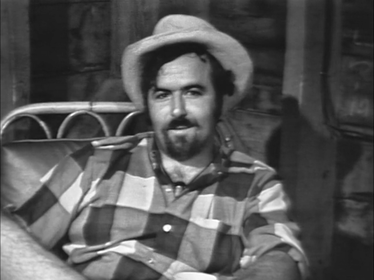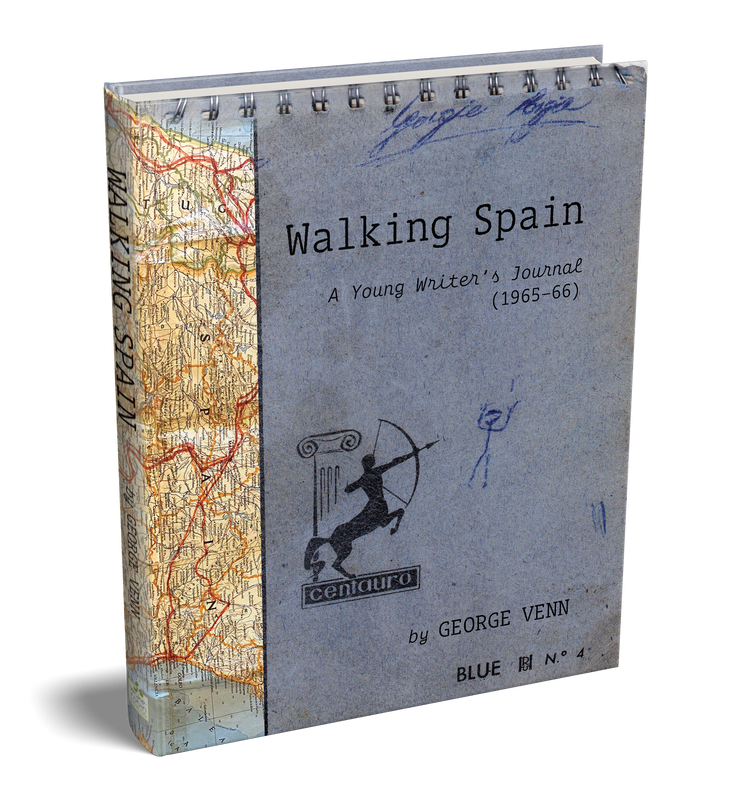|
|
Walking Spain
A Young Writer's Journal (1965–66)
By George Venn
Escaping the wild northwest fall of 1965,
George Venn, a 21-year-old would-be writer, secretly sets out alone on a 16,000-mile quest to discover Spain. Picaro, linguist, sophomore, virgin, lover, he records his travels to Salamanca to study at that famous university. Eventually expelled, short funds, fired, seduced, what happens when he sets out in winter 1966 to walk Spain? This journal tells that uncensored story—pack, tent, wits, sleeping bag, and more. From the winner of the Pushcart Prize, the Stuart Holbrook Award, Oregon Book Awards, and Poetry in Motion comes the veteran writer, editor, and poet’s 1960s memoir. 8 x 10
228 pages 14 color photo collages First Edition: November 2023 Paperback ISBN: 978-1-946970-16-9 $35.00 Hardback (Case-Laminate) ISBN: 978-1-946970-15-2 $60.00 Published by Wake-Robin Press An imprint of redbat books La Grande, OR 97850 Book Design by redbat design |
Meet the Author
 IMAGE: Vermont PBS, Bread Loaf Writers’ Conference, August 1971.
CLICK IMAGE TO VIEW THE FULL VIDEO
IMAGE: Vermont PBS, Bread Loaf Writers’ Conference, August 1971.
CLICK IMAGE TO VIEW THE FULL VIDEO
George Andrew Fyfe (1943– ) was conceived in the Nisqually River watershed—south of Mt. Rainier National Park. After his father died suddenly in 1944, he was raised until school age by his maternal grandparents among the evergreen Cascades, in their family apiary, on their rural homestead, and by a strong work ethic—all augmented by musical and King James traditions. In 1947, his mother married Rev. Frank Venn, a strict conservative Presbyterian minister who adopted George and his brother, thus changing their names to Venn. In 1957 his new family moved from the coast to the gold larch mountains of Spirit Lake, Idaho where, as student body president, George graduated in 1961, then accepted an athletic scholarship to The College of Idaho. Foregoing athletics, he worked summers as a beekeeper, logger, lineman, office manager, and during undergraduate years as stage manager, tennis player, actor, baritone soloist, choir manager, and finally a literary editor.
As a freshman he published his first fiction in Prospectus, the campus literary magazine. Still undecided about a major after his sophomore year, he flew to Ecuador to manage an office, perfect his Spanish, teach ESL for USIS, coach a basketball team, and sing on radio and television. Those months living free from family and cultural constraints, he began to write long letters on his Olivetti portable, a process he found gave him direction, inspiration, and discovery. Returning to The College of Idaho, he declared an English major, published another short story, then inspired by his Ecuadorian awakening, he decided to study in Spain. That year abroad is the subject of this 2023 book.
In 1967, he enrolled in the University of Montana MFA program, where he continued to write short fiction while also maintaining his diverse intellectual interests in culture, history, languages, music, conservation, and regional literatures. In his first graduate course he studied with Harold G. Merriam, renowned northwest literary editor. In courses with Richard Hugo and Madeline De Frees, he wrote his first poems. Garret, the university magazine, solicited and published his first literary fiction, and Montana the Magazine of Western History published his first northwest history. Continuing to write both non-fiction prose and short fiction with William Kittredge, he completed a historical novella, a dialogue between literature and history, an essay on the Arabic article in English, a linguistic analysis of Conrad’s use of Spanish, and many short stories. Employed as a trained beekeeper during graduate school, those skills converged with reading Aldo Leopold and the wilderness conservation movement. In the decades that followed, he would publish testimony, lectures, and articles on conservation, and for five years, he led the successful opposition to the dam on Catherine Creek in Oregon.
Graduating with an MFA in 1970, he moved his Australian wife, son, and daughter to the Grande Ronde Valley in eastern Oregon to accept an academic position at Eastern Oregon College (now Eastern Oregon University), a small, underfunded, remote, 4-year institution east of the Cascades. Over the next two decades, while developing and publishing as a writer, editor, and poet, he taught and administered the Creative Writing program, served as impresario for the Ars Poetica literary reading series, and adviser to Oregon East, the campus literary magazine. An outspoken untenured part-time professor working under largely privative conditions, he hosted many campus readings by nationally recognized poets and writers. Off campus, his multi-genre collection Marking the Magic Circle was honored with an Oregon Book Award; his poetry was praised and published in two books and won a national Pushcart Prize. As a regional literary activist, he published reviews, lectured, adjudicated competitions, collected folklore, advocated for arts and humanities programs, and taught the first courses in Western and Native American literatures.
In 1981–1982, he became one of the first American writers to teach English in post-Cultural Revolution China. Returning from teaching at South China University, he directed the Composition Program, and in 1988, he was asked to design and direct the new ESL (writing) program. That same year, after seventeen years without tenure, he resigned from his Creative Writing responsibilities.
In the early 1990s Venn twice conducted the “Baden-Württemberg/Oregon Exchange Program,” a three-week international orientation seminar for German graduate students. Continuing to write and publish, he held offices and served on the boards of literary, historical, environmental, cooperative, and educational organizations. In 1995, he was honored with the Andres Berger Award in Poetry by Northwest Writers Inc. For years, he also served on the executive committee and later as President of the Oregon Council of Teachers of English. As General Editor, he also designed and directed the nationally-recognized Oregon Literature Series (Vols. 1–6), the definitive historical anthology of Oregon literature. His work has been honored with numerous awards including the Stewart Holbrook Award for “outstanding contributions to Oregon’s literary life.”
After receiving the 2002 Distinguished Teaching Award from Eastern Oregon University, Venn resigned to actively continue writing, editing, and publishing. In this decade, he has published two historical works, a volume of personal essays, and a 460-page portfolio of northwest literary history. His poems have been included in 17 state, regional, and national anthologies, carved in stone, set to music by composers, included in feature films. In 2005, the Oregon Cultural Heritage Commission again recognized Marking the Magic Circle as “one of the 100 best Oregon books in the two centuries.” More recently, his monograph Soldier to Advocate (2007), his World War II Fred Hill album Darkroom Soldier (2008), and Endless Pressure, Endlessly Applied (2020) with Brock Evans have all earned high praise. In 2017, he was honored with the Lifetime Achievement Award by The College of Idaho, and by the publication of Lichen Songs: New and Selected Poems, his most recent book. “The Literary Lion of La Grande,” a short film by Eric Schultz, can be viewed on Venn’s website: www.georgevenn.com.
As a freshman he published his first fiction in Prospectus, the campus literary magazine. Still undecided about a major after his sophomore year, he flew to Ecuador to manage an office, perfect his Spanish, teach ESL for USIS, coach a basketball team, and sing on radio and television. Those months living free from family and cultural constraints, he began to write long letters on his Olivetti portable, a process he found gave him direction, inspiration, and discovery. Returning to The College of Idaho, he declared an English major, published another short story, then inspired by his Ecuadorian awakening, he decided to study in Spain. That year abroad is the subject of this 2023 book.
In 1967, he enrolled in the University of Montana MFA program, where he continued to write short fiction while also maintaining his diverse intellectual interests in culture, history, languages, music, conservation, and regional literatures. In his first graduate course he studied with Harold G. Merriam, renowned northwest literary editor. In courses with Richard Hugo and Madeline De Frees, he wrote his first poems. Garret, the university magazine, solicited and published his first literary fiction, and Montana the Magazine of Western History published his first northwest history. Continuing to write both non-fiction prose and short fiction with William Kittredge, he completed a historical novella, a dialogue between literature and history, an essay on the Arabic article in English, a linguistic analysis of Conrad’s use of Spanish, and many short stories. Employed as a trained beekeeper during graduate school, those skills converged with reading Aldo Leopold and the wilderness conservation movement. In the decades that followed, he would publish testimony, lectures, and articles on conservation, and for five years, he led the successful opposition to the dam on Catherine Creek in Oregon.
Graduating with an MFA in 1970, he moved his Australian wife, son, and daughter to the Grande Ronde Valley in eastern Oregon to accept an academic position at Eastern Oregon College (now Eastern Oregon University), a small, underfunded, remote, 4-year institution east of the Cascades. Over the next two decades, while developing and publishing as a writer, editor, and poet, he taught and administered the Creative Writing program, served as impresario for the Ars Poetica literary reading series, and adviser to Oregon East, the campus literary magazine. An outspoken untenured part-time professor working under largely privative conditions, he hosted many campus readings by nationally recognized poets and writers. Off campus, his multi-genre collection Marking the Magic Circle was honored with an Oregon Book Award; his poetry was praised and published in two books and won a national Pushcart Prize. As a regional literary activist, he published reviews, lectured, adjudicated competitions, collected folklore, advocated for arts and humanities programs, and taught the first courses in Western and Native American literatures.
In 1981–1982, he became one of the first American writers to teach English in post-Cultural Revolution China. Returning from teaching at South China University, he directed the Composition Program, and in 1988, he was asked to design and direct the new ESL (writing) program. That same year, after seventeen years without tenure, he resigned from his Creative Writing responsibilities.
In the early 1990s Venn twice conducted the “Baden-Württemberg/Oregon Exchange Program,” a three-week international orientation seminar for German graduate students. Continuing to write and publish, he held offices and served on the boards of literary, historical, environmental, cooperative, and educational organizations. In 1995, he was honored with the Andres Berger Award in Poetry by Northwest Writers Inc. For years, he also served on the executive committee and later as President of the Oregon Council of Teachers of English. As General Editor, he also designed and directed the nationally-recognized Oregon Literature Series (Vols. 1–6), the definitive historical anthology of Oregon literature. His work has been honored with numerous awards including the Stewart Holbrook Award for “outstanding contributions to Oregon’s literary life.”
After receiving the 2002 Distinguished Teaching Award from Eastern Oregon University, Venn resigned to actively continue writing, editing, and publishing. In this decade, he has published two historical works, a volume of personal essays, and a 460-page portfolio of northwest literary history. His poems have been included in 17 state, regional, and national anthologies, carved in stone, set to music by composers, included in feature films. In 2005, the Oregon Cultural Heritage Commission again recognized Marking the Magic Circle as “one of the 100 best Oregon books in the two centuries.” More recently, his monograph Soldier to Advocate (2007), his World War II Fred Hill album Darkroom Soldier (2008), and Endless Pressure, Endlessly Applied (2020) with Brock Evans have all earned high praise. In 2017, he was honored with the Lifetime Achievement Award by The College of Idaho, and by the publication of Lichen Songs: New and Selected Poems, his most recent book. “The Literary Lion of La Grande,” a short film by Eric Schultz, can be viewed on Venn’s website: www.georgevenn.com.

